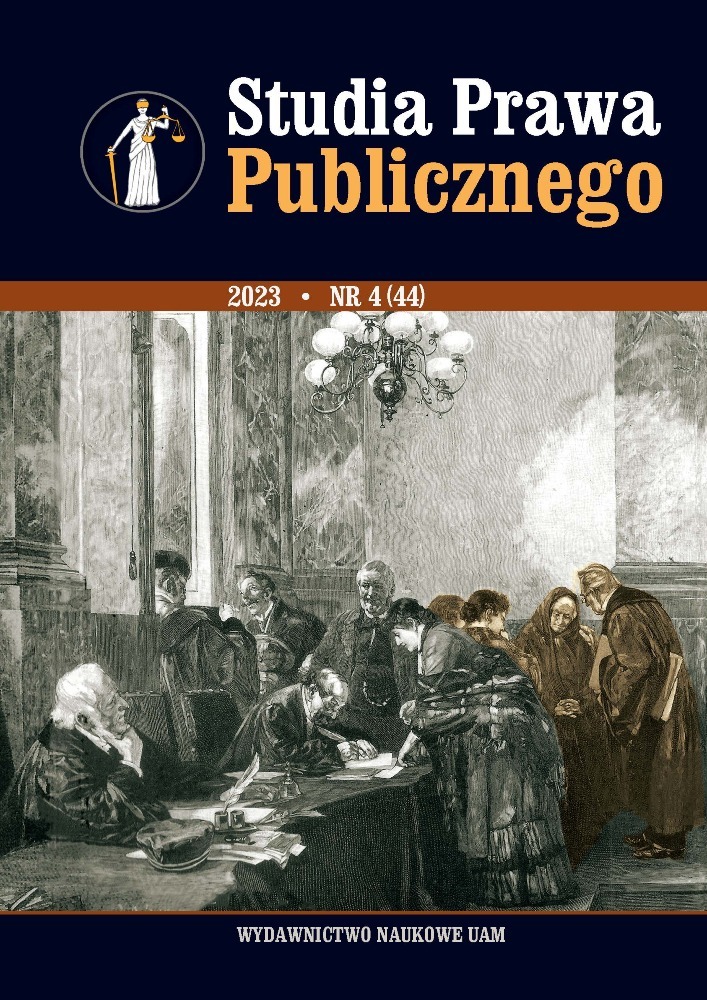Abstract
The gloss deals with an analysis of the provision of Art. 24f sec. 1 of the Act of 8 March 1990 on commune self-government (u.s.g.), from which it follows that councillors may not conduct business activity on their own account or jointly with other persons using the communal property of the municipality in which the councilor obtained the mandate, as well as managing such activity or be the representative or proxy in the conduct of such activities. Violation of this prohibition results in the loss of the ticket. The established anticorruption provision still raises many doubts. As a rule, it is assumed that due to its purpose and the subject and scope of violations, this prohibition is not absolute. Particularly controversial is the use of municipal property by the councillor on the principles of its universal availability, consisting in making purchases in the councillor’s shop, which do not require the use of public procurement. In order to clarify the essence of this case, the issues that do not raise doubts under Art. 24f sec. 1 u.s.g. and which entail the absolute necessity of terminating the mandate of the councillor are discussed first. Following this, judgments are presented in which administrative courts found that the use of property on the basis of general availability is allowed unless it privileges the position of the councillor and any purchases made in stores owned by the councillor do not result from prior arrangements or contracts. The development of this concept is dictated by the content of constitutional provisions and the ratio legis of Art. 24f sec. 1 u.s.g.
References
Banaszak B., Porównawcze prawo konstytucyjne współczesnych państw demokratycznych, LEX/el. 2012.
Czaplicki K.W., Dauter B., Kisielewicz A., Rymarz F., Samorządowe prawo wyborcze. Komentarz, Warszawa 2006, LEX/el.
Dolnicki B., Art. 25, w: Komentarz do ustawy o samorządzie powiatowym, LEX/el. Folak Ł., O ograniczaniu wolności działalności gospodarczej, w: Wolność w prawie administracyjnym, pod red. J. Zimmermanna, Warszawa 2017, s. 289–316.
Gola J., Zakaz prowadzenia działalności gospodarczej przez osoby pełniące funkcje publiczne a dylematy dotyczące pojęcia działalności gospodarczej, w: Nowe problemy badawcze w teorii publicznego prawa gospodarczego (z uwzględnieniem samorządu terytorialnego), pod red. L. Kieresa, Wrocław 2010, s. 63–74.
Karciarz M., Skutki wykorzystania przez radnego mienia komunalnego, LEX/el. 2017.
Kocowski T., Ograniczenia działalności gospodarczej osób pełniących funkcje publiczne – reglamentacyjna funkcja państwa na przykładzie ustawy z 21 sierpnia 1997 r., w: Funkcje współczesnej administracji gospodarczej. Księga dedykowana Profesor Teresie Rabskiej, pod red. B. Popowskiej, Poznań 2006, s. 113–142.
Komierzyńska-Orlińska E., Art. 3 ustawy Prawo przedsiębiorców, w: Konstytucja biznesu. Komentarz, pod red. M. Wierzbowskiego, Warszawa 2019, s. 48–59.
Sierzputowski T., Ograniczenia dotyczące funkcjonariuszy gminnych przy wykonywaniu zadań publicznych, „Samorząd Terytorialny” 2000, nr 4, s. 14–24.
Trela A., Udział osób pełniących funkcje publiczne w zarządzaniu kołem łowieckim, „Ruch Prawniczy, Ekonomiczny i Socjologiczny” 2016, nr 78(3), s. 109–124. DOI: https://doi.org/10.14746/rpeis.2016.78.3.9
Wierzbica A., Art. 24f, w: Komentarz do ustawy z dnia 8 marca 1990 r. o samorządzie gminnym, pod red. B. Dolnickiego, Warszawa 2010, LEX/el.
Zbrojewski M., Prowadzenie działalności gospodarczej jako przyczyna wygaśnięcia mandatu – zagadnienia wybrane, w: Samorząd terytorialny w Polsce a sądowa kontrola administracji, pod red. B. Dolnickiego, J.P. Tarno, Warszawa 2012, LEX/el.
License
Copyright (c) 2023 Anna Trela

This work is licensed under a Creative Commons Attribution-NoDerivatives 4.0 International License.

